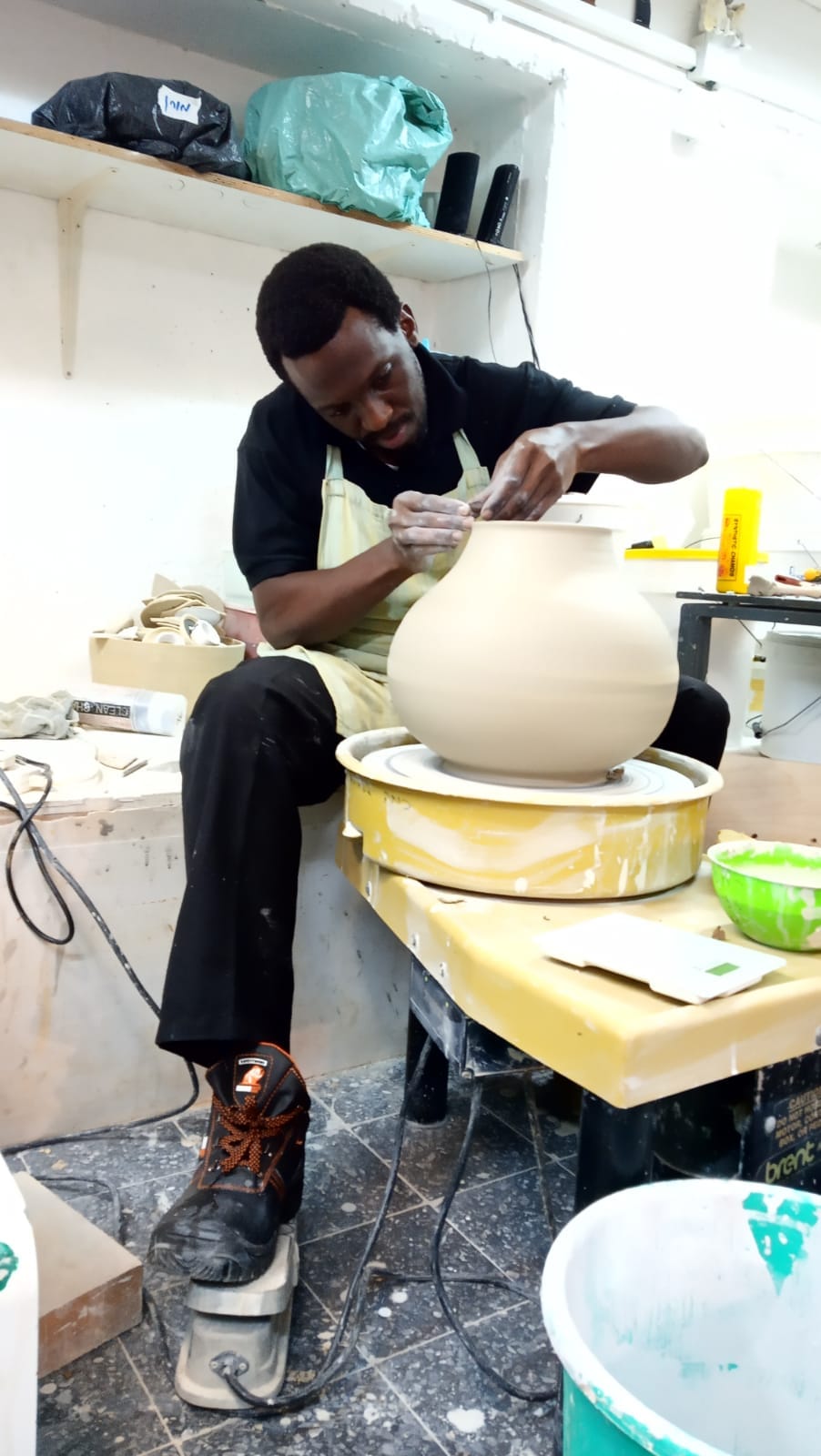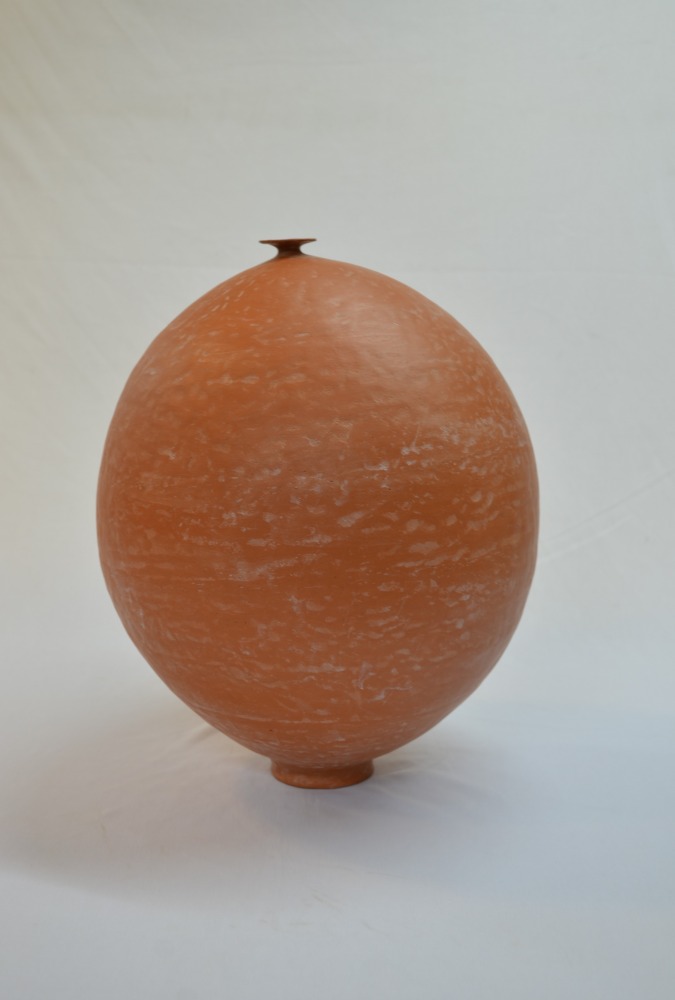
The Art Academies Exchange Program, run by Israel's Bezalel Academy of Art and Uganda's Makarere University, creates unique opportunities for cross-cultural creative cross-pollination. Edward Balaba from Makarere University describes his contribution to the project.
As a practicing ceramic artist and faculty member at Makerere University, over the last three years, I have been part of an international exchange program between two leading art academies in Uganda and Israel. The exchange program, facilitated by the two academies— Makerere in Uganda and Bezalel in Israel—is made up of both academic and artistic aspects. It provides an avenue for the cross-cultural transfer of skills and knowledge between two countries with different potentials, which otherwise would not be fully tapped. This is an opportunity for me to share my personal experience and my take on the program.
The Israeli-Ugandan Art Academies exchange program facilitates the exchange of technical and scholarly knowledge between the two settings, in the process sensitizing students and faculty to unfamiliar culture in an equal and collaborative setting. The goal of the program, created and directed by the CoCuDi Center, in collaboration with the African Studies Gallery, is to promote and develop collaborative social, cultural, educational, and creative activities between leading Israeli and Ugandan art academies. The program thus allows for social and personal empowerment, and socio-economic and cultural development.
As part of the exchange program, it was an honour to be selected as a pioneer faculty member from Makerere University’s School of Industrial and Fine Art for the program, during the 2018-2019 academic year. As part of the program, I spent two semesters training in the Ceramic and Glass department at Bezalel School of Art. Principally a teaching assistant, I was also presented opportunities to develop my skill set via the department’s courses. In courses for exchange students from the Theory and Criticism department, we shared cross-cultural ideas with peers from different parts of the world, intersecting with the cultures of Israel.
During the academic year at Bezalel, I was part of a research group of teaching assistants in the department, tasked with using design, craft, and art to address predefined challenges. We selected a design technology challenge relating to materials, production, and population needs, experimenting with locally sourced materials to create an organic casting process using natural and recyclable materials.
 Edward Balaba
Edward Balaba
Lying Object
Ceramic
2019

Edward Balaba
Terracotta Vase
Ceramic
2019
"Reflecting on the challenges back home, I recalled that glazing remains a big challenge for domestic artisans and craftspeople. Materials are expensive and inaccessible, and the formulas are forbiddingly sophisticated to actualize...[with] the knowledge from the ceramic technology class I attended, I was able to unpack glaze formulas and source accessible substitute materials at home."
During the exchange program, I conducted research into glazing processes. Reflecting on the challenges back home, I recalled that glazing remains a big challenge for domestic artisans and craftspeople. Materials are expensive and inaccessible, and the formulas forbiddingly sophisticated to actualize, especially for potters who do not belong to major institutions. The firing temperatures for conventional glazes is very high, and beyond the capacity of local kilns. With the knowledge from the ceramic technology class I attended, I was able to unpack glaze formulas and source accessible substitute materials at home. I identified the banana as a common plant that contained glazing-related components in its ash. I planned a process of collecting banana peelings, drying them out, then burning them for ash. I then prepared sample formulas, which I tested at different temperatures and on different surfaces. From this, I was able to get a transparent glaze formula and a matt white opaque glaze.
My success with these trials inspired me to explore in closer detail materials and other resources around me. It also revitalized an earlier desire to investigate indigenous pottery-making activities, as a way of advancing local technology by using current trends to make a hybrid. The trial transformed my perspectives on studio research and the projects we designed for ceramics class. I was particularly interested in the pottery locale of East Africa, specifically the production methods for decoration firing and other finishes. I am particularly curious about understanding, and from this articulating, the processes used for making vessels and the reasons that informed these choices. It is, I believe, always important to be able to reproduce as well as explain a particular technique or skill, even if the process involves happy accidents. I have noted that some skills can become so embedded in a draughtsman’s physical involvement that it becomes a challenge to explain how the processes lead to the end result—making it difficult to share these technical advances to others who can benefit from them.
Since the beginning of the 2020-2021 academic year, the Art Academies Exchange Program has been conducted mainly online due to the COVID-19 pandemic. It has been a privilege to participate in these online activities, teaching a course called "Perspectives in Indigenous East African Pottery."
In this online, fall semester course, I teach a hybrid East African pottery class to Bezalel Academy students. The course focuses on the historical development of pottery in the East Africa region, highlighting traditional methods, materials, and tools. Bezalel students have been able to negotiate all the challenges arising from the endeavor to share artistic skills, using a virtual environment to experiment with traditional techniques, with the guidance of an expert potter. Better still, they have the opportunity to interact with artisans, with lots of experience in ceramics, to make comparisons between academic studio potters and local artisans. Students are able to tap fresh and indigenous knowledge from the community, negotiating it in a studio environment to inspire new designs and approaches.
As part of the virtual academic exchange, we also have the "Peer Learning" course for students from Bezalel and Makerere. In this unique course, led by Tamar Dekel of the CoCuDi center, students from both art academies share their backgrounds, skills, and knowledge, working on joint projects. As a course coordinator and a faculty member at Makerere, it is exciting to see the impact of the exchange on the students' creativity, boosting their confidence in their craft and their presentation skills.
As a ceramic artist and an education professional, it is fulfilling to see the goals of social, cultural, educational, and personal development being achieved. I am particularly proud of playing a meaningful part in the process.
EDWARD BALABA
An alumnus of Makerere University Kampala, an Uganda-based ceramic artist, and a lecturer at his alma mater. He has been a practicing artist for more than a decade and a teacher for over 17 years. Edward describes his work practice as inspired by the materiality of things constructed by communities. “I borrow elements from day-to-day life, and I am interested in fabricating ceramics in an experimental way. I mainly work with hand-building techniques, combining slab, coil, throwing, sculpting, and joining parts in a fabrication way.”


